News & Stories
One year later
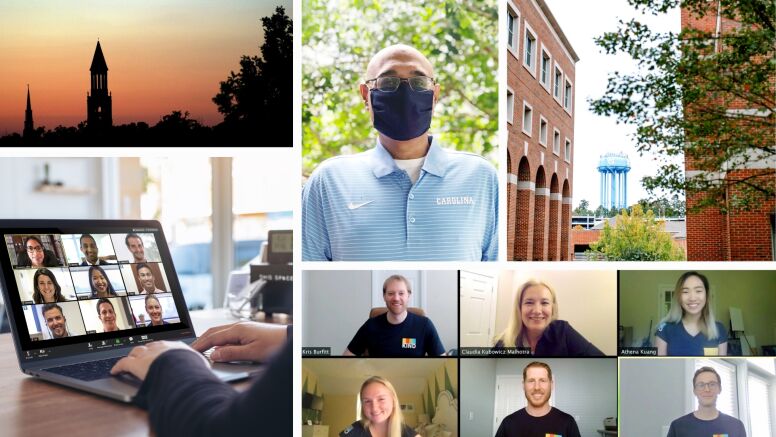
“You’re muted.”
That common refrain could be heard in countless Zoom meetings, classes, webinars and special events since March 23, 2020, when COVID forced UNC Kenan-Flagler to move classes online, and faculty and staff to working remotely.
One year later, the UNC Kenan-Flagler community is both weary and resilient. Like others around the world, the community is feeling the loss of loved ones, missing in-person social interactions, balancing working from home while caring for others and home schooling, mastering remote learning/teaching/working – all amid growing concerns about racial inequality, mental health, the toll on women in the workplace and economic uncertainty.
From the start of the pandemic, the guiding goals for the UNC Kenan-Flagler community have been to:
- Ensure the health and safety of our students, faculty and staff
- Keep our students on track for learning and graduation
- Continue teaching, research and service at the highest levels
“We’ve achieved these goals, learned important lessons, and accomplished more than we could have dreamed possible,” said Dean Doug Shackelford.
A record number of students enrolled at UNC Kenan-Flagler. They worked in virtual internships and started full-time jobs. Faculty learned to teach and connect with students in new ways, and continued to publish research and books. Staff, the engine of the School, supported the community, from IT to global learning to career support and much more.
“The last academic year ended and the new academic year began in ways we’ve never experienced, but we feel enormous pride about our ability to achieve our priorities, the innovative ways we addressed new challenges, and the flexibility and acts of kindness demonstrated by our students, faculty and staff,” he said.
“We have so many heroes who are working tirelessly and with great compassion to support our students and, in fact, the entire community,” Shackelford said. “Our students, though disappointed and frustrated, demonstrated resilience, flexibility and a commitment to keep learning. Our faculty and staff have worked so hard, and they keep on giving. I’ve never been prouder of our people.”
Playing it safe
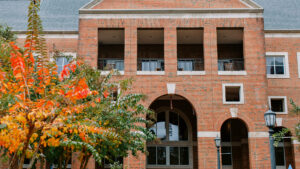 McColl Building is open for students to attend in-person classes, study, take exams and interview. The School is offering classes in three formats – fully remote, fully in-person, and remote and in-person simultaneously (known as dual mode) – with the majority of students choosing to take classes remotely.
McColl Building is open for students to attend in-person classes, study, take exams and interview. The School is offering classes in three formats – fully remote, fully in-person, and remote and in-person simultaneously (known as dual mode) – with the majority of students choosing to take classes remotely.
School leaders developed safety guidelines, including guidance on employee schedules and physical distancing, facilities modifications and new protocols to limit transmission of the virus. The facilities team has worked tirelessly to keep the community safe, and members followed the required mask wearing, social distancing and hand washing. At the University level, the UNC Hall Pass app supporting the COVID-19 testing program was built by Professor Steven King, who holds a joint appointment with the UNC Hussman School of Journalism and Media and UNC Kenan-Flagler.
Meeting the challenges
Everyone explored new approaches to learning and interacting online. Moving all programs online was a mammoth undertaking from both technological and teaching perspectives. The School’s long track record of successful online programs – MBA@UNC since 2011 and the online MAC format since 2015 – benefited the transition to learning and working online.
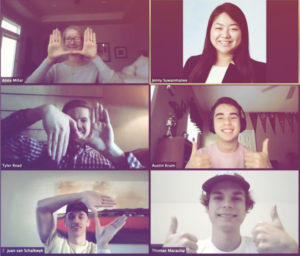
Some of the 456 undergraduate students who attended the UBP’s new student orientation, Spark, virtually in December.
Still, many professors had never taught online, and most students had not learned online. It was a sea change.
In March 2020 within a two-week timeframe, the IT staff helped transition approximately 100 teaching faculty, a few thousand students attending in-person classes, and 350 on-campus staff transition to teaching, learning and working remotely. In addition, the IT staff worked with facilities to redesign classrooms for dual-mode instruction.
The pandemic accelerated the digital transformation already underway at the School.
“Our community did a fantastic job of embracing an agile and experiential business model with great resiliency,” said Georgia Allen, chief information officer. “Throughout this past year, as we learned from our experiences, we continued to add newer technologies and collaboration tools, continuously improving the student experience. Many of these new tools and the best practices we developed will continue to have enormous value when we return to a more typical campus experience.”
In the last year, the IT team managed 148,380 Zoom classes and meetings with 819,948 students and participants; 414 webinars with 29,935 participants; and 13,871 recordings.
And the transformation wasn’t just in the classroom. Events large and small went online, too.
- The annual Undergraduate Business Symposium, in its 36th year and one of the oldest and largest student-run career development events in the U.S., virtually, expanded across three days in September. It attracted about 400 students and 30 employers and, for the first time, three minority-owned small businesses.
- The 10th annual Business of Health Conference and the webinar “Healthcare in 2021 Under the Biden Administration” drew record attendance.
- The Center for Sustainable Enterprise launched the India Impact Challenge powered by Quantum, a global competition focused on climate change.
- The Entrepreneurship Center launched several initiatives, including a strategic DEI focus, Scale School, the Innovation Internships program and more mentoring.
- The Venture Capital Investment Competition went virtual, from regionals to the upcoming finals in April.
- Students scored wins in competitions, including first place (for the second year in a row) in the UCLA energy competition; first place in NYU Stern’s Fixed Income Competition; second place in Cornell’s Investment Portfolio Case Competition; and first place in the Deloitte MBA National Case Competition. Virtual for the first time in its 16-year history, the 2020 Alpha Challenge – one of the world’s premier stock-pitch competitions – leveraged the format to increase the number of schools from 16 to 19. UNC Kenan-Flagler’s team won both second and third place.
- The Advancement team hosted multiple virtual events each month for alumni, parents and friends on a wide range of topics for thousands of attendees. They also changed Alumni Weekend to a virtual Alumni Week 2021 with nearly 30 virtual sessions.
The School marked record enrollments in the UBP, MAC and MBA programs for fall 2020. UNC Executive Development continues to help develop leadership talent within its corporate and military clients, for some by providing a safe learning environment at the Rizzo Center, and for those who are unable to travel, collaborating to offer counsel and new virtual learning opportunities.
Other wins include:
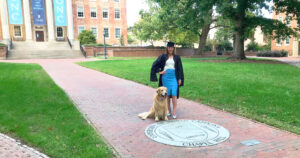 We celebrated the achievements of 931 students in virtual graduation ceremonies for the four MBA programs, and both MAC program formats and the successful defense of PhD dissertations.
We celebrated the achievements of 931 students in virtual graduation ceremonies for the four MBA programs, and both MAC program formats and the successful defense of PhD dissertations.- 100 Women launched to harness the power of alumni to attract more talented candidates to the MBA Program.
- All four MBA programs received STEM designation.
- The Dean’s Fellows Program got a new name and enhanced opportunities for Full-Time MBA students, thanks to Steve Vetter (BSBA ’78) and Debbie Vetter (ABED ’78).
- When a MBA@UNC Summit in Vancouver had to be cancelled in March 2020, the School created a new and first-of-its kind class on COVID-19.
- Evening MBA students pulled together to find PPE equipment when it was scarcest in the earliest days of the pandemic, and Dan Finkenstadt (PhD ’20) wrote about how healthcare leaders can prepare for the next health crisis.
- The Kenan Institute of Private Enterprise fulfilled its mission to leverage the private sector for the public good by having faculty experts share academically rigorous research and expertise on the business, human and economic ramifications of COVID-19 through press briefings, webinars, white papers and op-eds. In addition, the Kenan Institute and the North Carolina CEO Leadership Forum developed a dashboard that aggregates real-time, non-standard economic and public health data to guide critical policy decisions on reopening the state’s economy amid COVID-19.
- The UBP and MBA programs’ global teams were disappointed, but not deterred when students couldn’t travel. They developed innovative programs, including Virtual Global Immersion Electives, connected with UNC students with students in other countries, and developed new courses such as “Managing COVID-19’s Unintended Healthcare Challenges in Kenya and the U.S.” GLOBE students received special permission to study in-person in Hong Kong.
- Kenan-Flagler Cares continued to support its nonprofit partners through financial support, service projects, and leveraging the community’s expertise. The need was great and the community stepped up to help partners Super Cooper Little Red Wagon Foundation, Porch Chapel Hill-Carrboro andCompass Center for Women and Families.
Building for the future
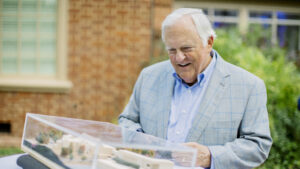
Bell looks on to proposed model of the new building.
A huge source of optimism was the announcement of plans for a new building that will make it possible to increase Undergraduate Business Program enrollment by at least 50% and attract more top students from around the globe to attend our graduate programs. The N.C. General Assembly passed a bill signed by Gov. Roy Cooper to provide $75 million in funding to expand and enhance the Business School campus. Investing in the future, Steven D. Bell (BA ’67) and Jackie Bell pledged $25 million to support the new building. An anonymous donor also pledged $25 million.
Calls to eliminate racial bias and promote inclusion at UNC Kenan-Flagler spurred changes across the School, from the curriculum to hiring, adding inclusion to our core values, and changing the lobby to showcase those values. The work continues to ensure diversity, equity and inclusion in all we do. The School is working with the University Commission on History, Race and a Way Forward to honor the approximately 120 enslaved people buried in Barbee Cemetery at the Rizzo Center in Meadowmont.
What’s next for learning
Someone called the next stage of the pandemic as moving toward “normal-ish.”
Once faculty members were teaching in the new online environment, they realized they could teach in it and could have meaningful and effective interactions,” said Jennifer Cutts, director of curriculum and innovation.
In the early days of the pandemic, the faculty’s main concern was to ensure students had equitable access and were able to learn as effectively as in the traditional classroom. Faculty who had never taught online moved from the “fear factor” to embracing it and, best of all, seeking help to be more effective in this new format and excited about how online teaching approaches can have an impact on the student experience and the learning environment.
“Last spring, we had to learn all of this amid fear, disruption,” she said. “We didn’t have lots of choices – we were learning in the midst of the crisis. We had to make a lot of hard decisions in reaction mode to things we’ve never experienced. Since then, we’ve planned for the pandemic. We can take pride and comfort in that we responded well in the crisis – we communicated openly, were compassionate and stayed safe. We focused on learning, community and connection. We were agile amid great uncertainty. Over the summer we had learned lessons and could plan strategically for a learning experience in a new environment. Now we can celebrate that win and rethink best practices for whatever comes next.
All the pieces were there to be able to go online; the pandemic accelerated our adoption, says Cutts. “Now we are thinking about how we get back to a better normal, a better version of what we have now, and as we all have more choices take the good of what we’ve achieved to create a new model of what learning should be. Educational and corporate leaders alike will need to figure out how to make the online environment work for us all.”